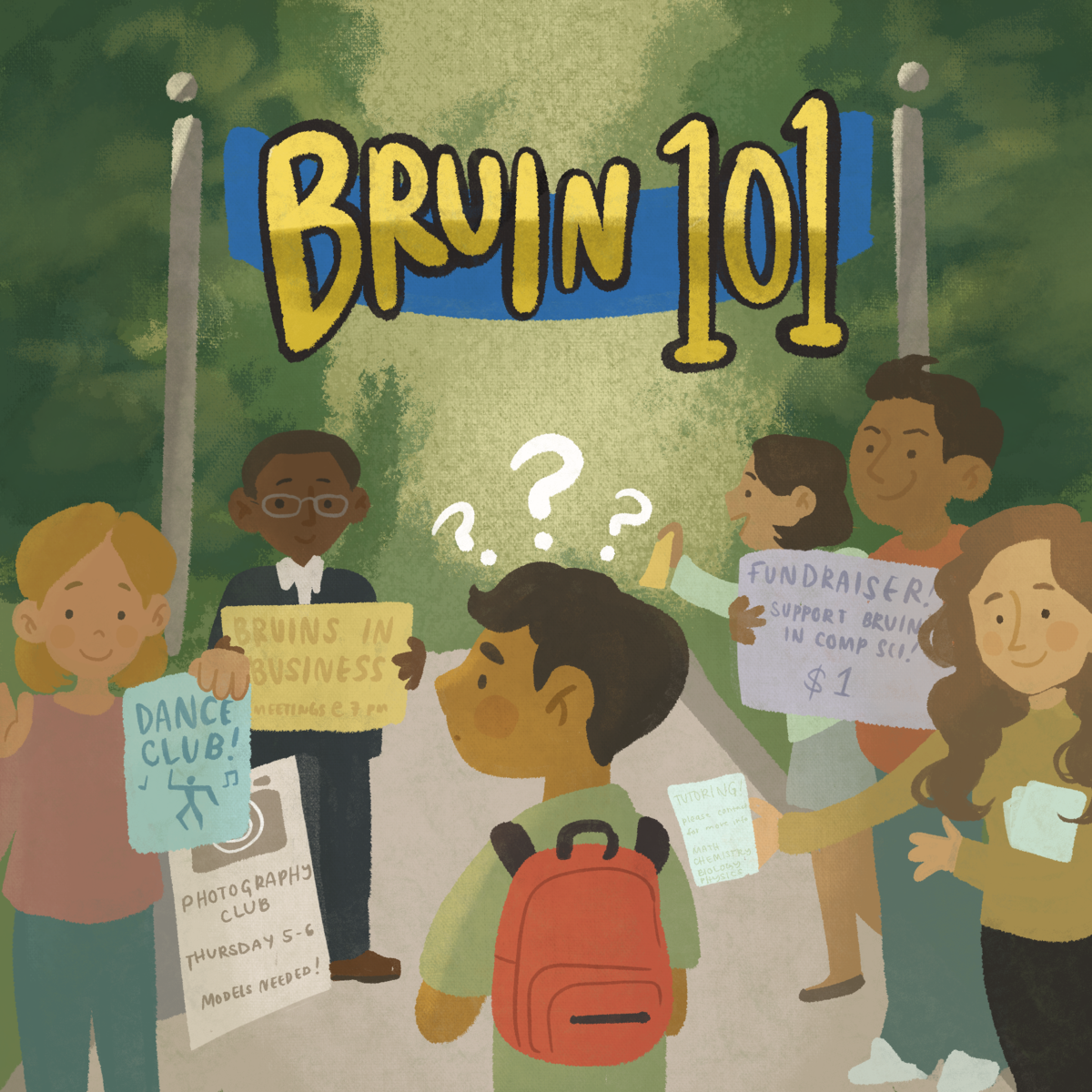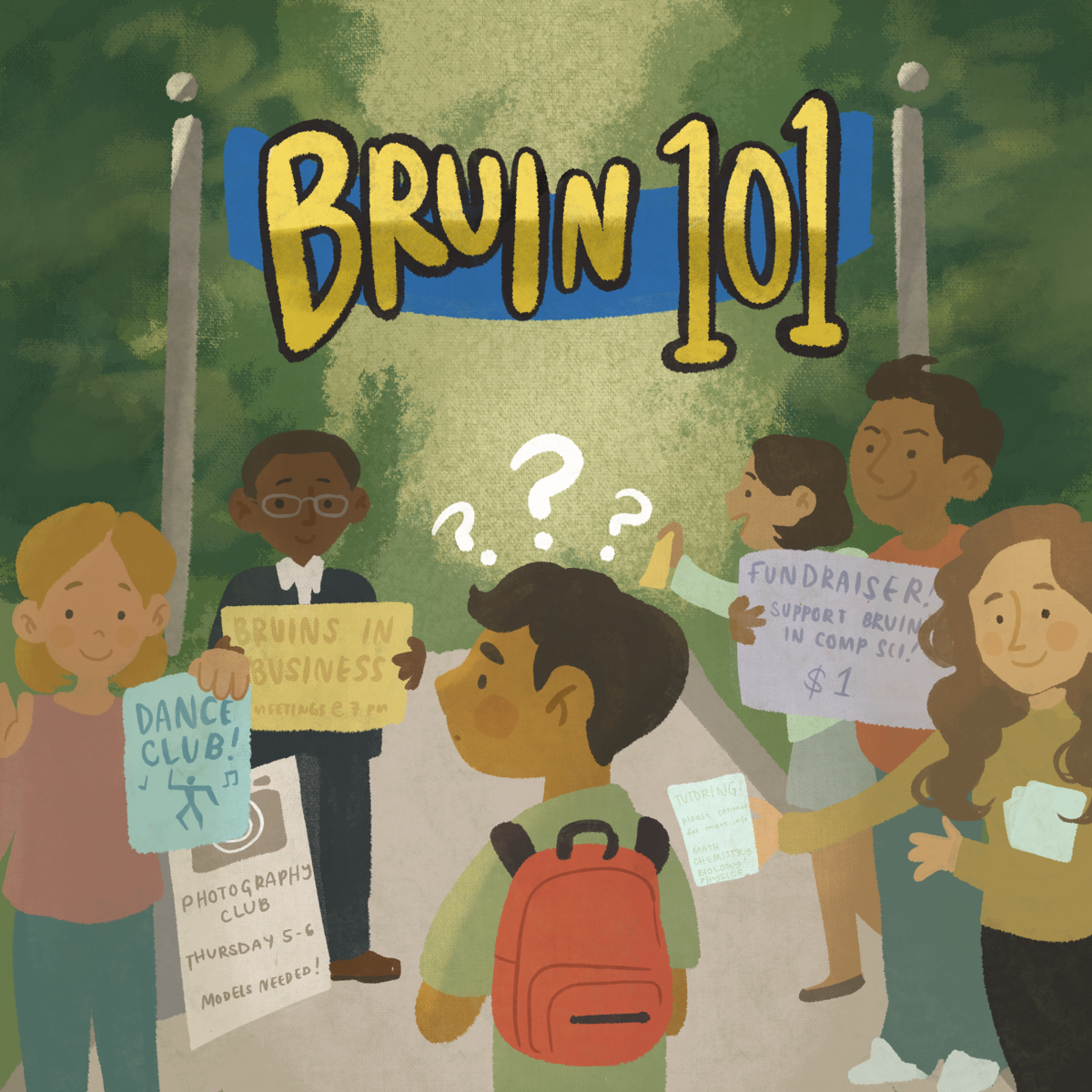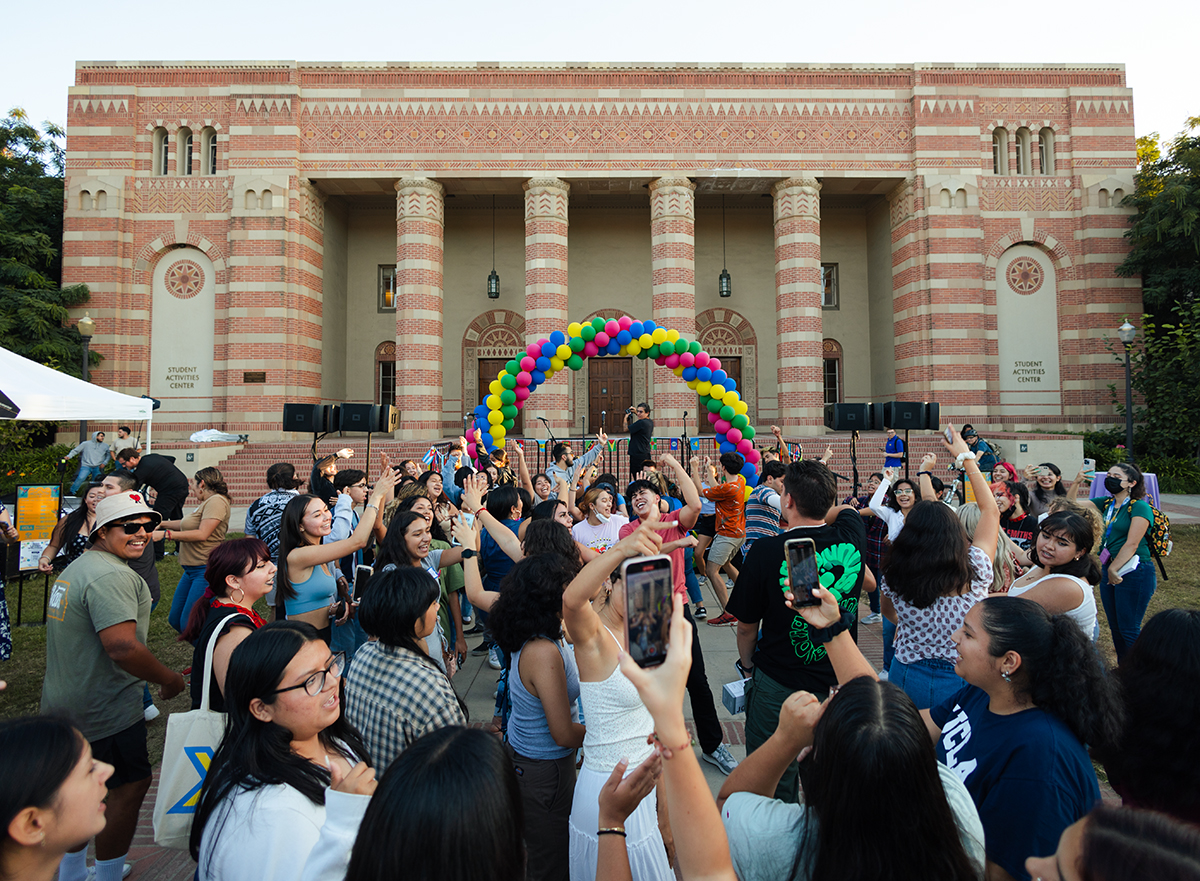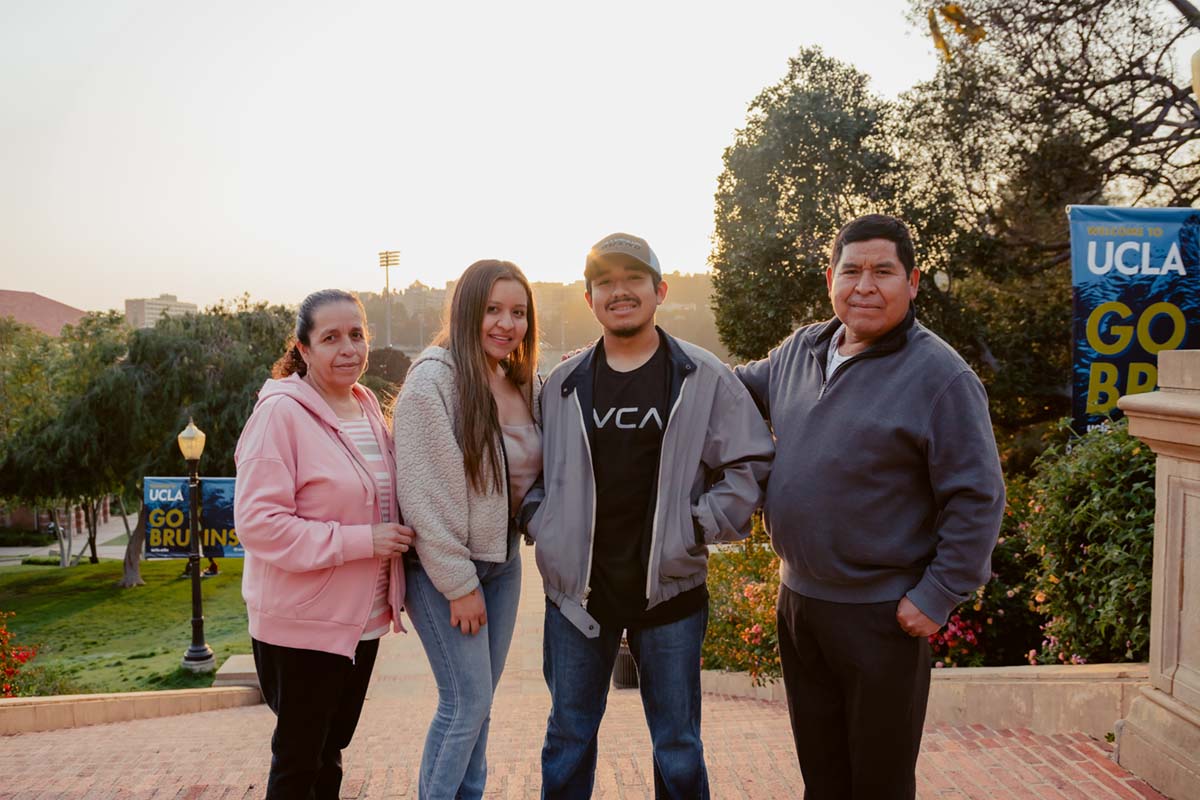Bruin 101: The Latinx Experience, Part 2

(Katelyn Dang/Daily Bruin senior staff)
In this episode of “Bruin 101,” a Daily Bruin podcast about life at UCLA, Podcasts contributor Kyla Ventura hosts Photo assistant editor Joseph Jimenez and PRIME contributor Carlos Ramirez to share their stories and advice about being Latinx students at UCLA.
Kyla Ventura: Hello, and welcome to Bruin 101, a Daily Bruin podcast that is made by Bruins for Bruins. In this series, we will help students and prospective students learn about and adapt to UCLA by providing insight into the school, sharing helpful tips and discussing concerns. This episode is the second part of a three episode miniseries where I will be hosting two students as they share their experiences, perspectives and advice on being Latinx students at UCLA.
Joseph Jimenez: I guess what I was gonna say next was, I think I’m fortunate in the way that my family, at least my parents, aren’t that typical ‘Oh, you need to support the family. You need to do that.’ I’m lucky in that sense. But also there is a level of that, right? It’s—
Carlos Ramirez: It’s unspoken.
JJ: It’s unspoken. My mom went to college. She went to Cal State Dominguez Hills, sociology major.
CR: Aight bro, good for her.
JJ: Good for her, right. And she got it right. But it was to support her family. It was to support her mom, it was to support all her siblings. And she still does that to this day. And her biggest thing to me is, you need to get a job that makes you money. But it also needs to make you happy.
CR: Yeah. Which is like—
JJ: Which is what everyone says. But a lot of the days she says, “As long as you’re working a job that makes you happy and you’re able to keep a life, that’s all that matters.” But at some conscious level, it’s still, ‘You need to support, you need to find a job that pays well, straight off the bat.” I say my mom is a bit more progressive/liberal than most traditional Latino parents who are stereotypically conservative, and it’s all about la familia, it’s all about that. So it’s more of like, I’m lucky in that sense, but at some super sub-level, it’s ingrained in our blood.
CR: Yeah, exactly.
JJ: It’s ingrained in our blood, somehow, some way that we always have to find a way to provide. Whether it’s for ourselves, or our family. And it’s this constant badgering of pressure. A lot of the time we, at least for me, I take a lot of pressure every day of my life. Every day that I’m here, everyday that I step onto campus. Every day that I’m on assignment, every time that I do something that’s not outside of my dorm, there is some pressure for me to exceed beyond what is normally expected.
CR: Yeah, yeah, yeah. And it’s just, I mean, that’s the reality of a lot of people of color, but a lot of black and brown people. And places where a lot of Black and brown people are from.
JJ: UCLA said that they wanted to be an HSI. An HSI is a Hispanic Serving Institution. However, all that means—
CR: Cap.
JJ: However, all that means is that 25% of its enrolled students must identify as Latinx students. That is the only—
CR: Or Hispanic.
JJ: Or Hispanic.
CR: Which is a whole thing. It’s a whole thing—
JJ: Hold on. That’s the only stipulation. All UCLA needs to do is say that 25% of their students are enrolled, that identify as Hispanic or Latinx. There is no other limitation, there is no other stipulations. They don’t need to create more programs. They don’t need to create any more access things for us, any safe spaces. All they need to say is that we have the numbers, give us more money. At this point, UCLA is all about walking the talk. They are not actually going to be an HSI. Given what they offer Latino students now, they’re literally not going to be an HSI, in actuality. It’s only going to be by name. And that’s the worst part. Right. I mentioned that I was in the Research Rookies program last year. That was a program part of AAP, and we designed a research project based on whatever our interests were. I designed a research project that looked at Latino males at UCLA and their masculinity, and what UCLA could do with it. In my findings, or at least when I did my research design project, I realized that there weren’t many faculty members that were Latino. There weren’t many programs that were available for Latinx in general for mental health. There weren’t any of those things. It was literally just the same resources with a couple of things here and there. You know what the worst part was? Most of the faculty, you know where they were housed in?
CR: Where?
JJ: Guess what department they were housed in. Guess.
KV: Chicana/Chicano Studies?
CR: Chicana/Chicano Studies?
JJ: Yes. And it’s even worse when you look at the sexism that exists. That’s an entirely different conversation, but my research focuses on introducing or adding more staff members that are Latina, because that’s what helps us at the end of the day. Having more women in institutions such as this place will actually benefit everyone, and not having masculinity and machismo at the top. Because all it does—
CR: Woo, speaking facts.
JJ: Having toxic masculinity at the very top, all it does is degrade every single person. It doesn’t help Latino males. It doesn’t help Latinas. It literally only degrades us. And so it’s a very interesting thing to think about the fact that UCLA wants to be an HSI, they’re going to be one at the rate that they’re going. But based off my own experiences, what I’ve seen, UCLA is far from an HSI, from a real HSI.
CR: Yeah. And it’s so interesting, too, because— I mean, we could talk for so long about census data, bro. And the fact that—
JJ: The fact that we can’t even put Latino. Yeah, we have to put white. And then there’s another box for us.
KV: Or there’s an “Other.”
CR: Or just an “Other.” Which is literal otherization. But like, we’re being ghettoed in the census, bro. Okay, so basically, in the census data, in any sort of form that you’re filling out that asks about your race, there are two questions. There’s race, and then there’s, “Do you identify as Hispanic or Latino? Yes or no.” And it’s essentially two different questions, because Hispanic/Latino is not technically a race. And there are a whole host of reasons for that. And race itself is obviously like—
JJ: An entirely—
CR: Yeah, it’s constructed.
JJ: That we’re probably not qualified to talk about.
CR: I mean, we’re sociologists.
JJ: That’s right. We can talk about it later.
CR: We can talk about it later. But, socially constructed, whatever, right? I mean, it’s interesting. It’s interesting. It’s such a precarious category, right? And the experiences of any Hispanic person from any place, they’re just going to be so different, right? Like, the experiences of an Argentinian is going to be completely different than the experiences of a Salvadorian.
JJ: Absolutely.
CR: And it’s wild too. It’s wild. It’s just weird, dude. And fulfilling that sort of Hispanic institution thing? And using just the data? It’s sort of ignoring the humanity of any of it. It’s the blunt reality that the ones who get here who are Latinx, they need more. They need more, there’s more generational trauma, because of the reality of being immigrants, or the children of immigrants, or the children of refugees from wars, and stuff like that. That weighs on a family for so long.
JJ: Especially the person who now has the ability to see all that trauma, then all that burden is kind of left on you, to then overturn it. And that’s not going to take another couple of generations to fully flesh out.
CR: Exactly, and any Latinx person who’s here is essentially the turning point. That’s crazy pressure. Right? And if the reality of it is that to be an actual Hispanic, yeah, Hispanic Serving Institution, you need to do something like that. You need to support that, you need to realize that and acknowledge it, because the experiences of a Hispanic person are different than the experience of your average white student. Just fundamentally, I mean, until they do something like that. They’re not a Hispanic Serving Institution.
KV: Like, for me, I couldn’t get into AAP because both my parents went to college. And then, so I think that’s also, I’m in the very middle like—
CR: Yeah, which is the thing too, they gatekeep resources.
JJ: Okay. You reminded me of my position in high school. For a very, for a good chunk of the college process, I’m not gonna lie, I loathed my mom. I loathed her because she went to college. Right? Looking back on it, it was a very stupid mindset. But there were so many resources that I wasn’t able to get because they were being gatekept by whoever. Just because my mom went to college.
KV: PUENTE is like only for kids whose parents are first generation. My parents don’t remember, like applying for college or anything. And so that’s why it’s not fair.
JJ: Yeah, exactly. It’s like, how are you going to gatekeep all of these resources when we’re still struggling? Yeah. Like you never gave us a fair playing ground to begin with.
JJ: Yes, that’s the best way to think about that.
CR: I saw it in a cynical way. To be honest, I always thought I mean, we’ve been talking pretty cynically to begin with, but like, I saw in a pretty cynical way always. I was like, the institutions want the ones who have nothing so that they can say that they’re— the institution is the reason that they have something.
CR: And it’s like, they want to say that, ‘We’re the reason you have anything.’
JJ: You know what I think it is? White savior complex? Absolutely.
CR: Man’s spinning facts. I mean, it’s unfortunate, right?
JJ: Now, I think we’ve kind of bashed on a lot of things. How do we fix these things? How does UCLA now go? How have we coped with it?
CR: I mean, it’s an interesting thing to say to like, okay, then what do you propose? And that’s a question that’s like, boy, I don’t know, what? You asking me? That’s the thing though, right? It’s like, what does anybody do? Because just the reality of any Brown or Black person who comes to institutions like these, you face the institution. You come here with the institution being the adversity that’s preventing you from coming here, right? So you are very aware of all the institutional systems and forces at play. And it’s like any conversation with any Black or Brown person here, it’s always just like “these systems are against us”. And so what do you do when you realize that? When you’re faced with it all, and it’s like looming over you? And you have those moments where you’re like, damn, I gotta do something. I mean, obviously, it leads to some amount of depression and a bit despairing, right? It’s like, well, there’s nothing you can do. And when you face it as a whole – yeah, there’s nothing you can do. Like, what are you going to do? Wake up tomorrow and solve racism?
JJ: No, we can’t do that. We stage a coup.
CR: I mean, like, when you face it as a whole, it’s so daunting, and it’s frank, it’s so oppressive. The only real alternative to not face it as a whole is to take it step by step, day by day, conversation by conversation, right? All you really do is relish in the beauty, right? Relish in the community, relish in all that is great about the Latinx community here to help foster, to help it grow. So you meet people and you make friends with Latinx people and you talk about race, you talk about your experiences. Be unafraid to say that, “It’s different for me here.” And when you get those looks, because you will get those looks. My last year spring quarter, my 4W class, my teacher and my TA were amazing. Their name was Sarah Bishop, they’re a TA in the English department, obviously. They were actually amazing. Shoutout to Sarah.
JJ: She was my TA all of last year for the entire 10 series for English. Yeah, it was crazy. Her name was Gabriella. Shoutout to Gabriella. She was the very first staff member that was Central American.
CR: Is she still here?
JJ: No, she’s now a professor. I think she’s now a professor at Cal State LA. She’s moving up in the world.
CR: That’s good. Good for her. I’m just sad that I couldn’t have her.
JJ: She was great. She was also the very first person that I saw that was researching Central American literature.
CR: That’s crazy. Because ain’t nobody do that.
JJ: No one does it, right? Like, it’s crazy. Because like, okay, I guess this kind of brings me to another point. Even with brown people, you kind of feel alone. That’s a crazy thing to think about. Even when you’re surrounded by people who look exactly like you, because their experiences are so different from you, or because they’re not from the same background like you, you just feel so isolated. I’m not gonna lie, I almost quit the Daily Bruin, genuinely almost quit the Daily Bruin a couple times.
CR: Same, same.
JJ: It was last year, even a bit this year, I’m not gonna lie. It was weird because I think we have a diverse newsroom, compared to most other colleges. However, there’s not a lot of Latinos here. I just met you in the spring. There was a couple of other people.
CR: It wasn’t even in the newsroom.
JJ: It wasn’t even in the newsroom, it was just because we had a social and that was it. So I never mentioned this to you, but meeting you was actually a big turning point for me in the Daily Bruin. It was, I finally met someone that I connected to on a much deeper level than just skin color – that was something that kept me here at the Bruin, because I knew there was someone exactly like me, who had a very similar background, and not just because of skin color. Because for the first time I didn’t feel alone, which was a very wholesome thing.
CR: Yeah. I got you bro. I got you.
JJ: But that’s the thing, right? You can be surrounded by Black and brown people from all over the world and you’ll still feel alone.
CR: Because that’s the thing, right? They sequester us into groups. But even within those groups, there’s such a diverse range of experiences, right? It’s so diverse and we can talk about literally every single different province within every single different country within Latin America, and separated between South America and Central America and the Southern Cone of South America and then Mexico, but then Southern Mexico and Northern Mexico. And it’s like, all of their experiences are so different. It’s different skin colors, different languages, different cultures, right? Different food. But in every single place that’s not there, they’re like, “oh, that’s Latin America.” And it’s just such a flat and blanket term and statement that just generalizes all our experiences.
JJ: But you know, what does connect us? The food.
CR: Oh, the food. Segue. Wait, hold up. I never finished talking about Sarah. Sarah was insane. And in my English classes, we were reading about whatever the TA says. Justin, my boss last year, he’s enterprise director this year. His 4W class analyzed Harry Potter.
JJ: I had “Jane Eyre.”
CR: That’s crazy. I did old Christian texts about female mystiques. It was actually really interesting. It was actually interesting. I wrote a letter to Jane Austen and everything at the end, it was my final. It was not a real letter, she’s dead. But one of the main talking points that we’re supposed to talk about in that class was race. Lo and behold, we didn’t really talk about it that much. And that’s because nobody was answering the question. Because everybody there— I mean, it makes sense to an extent. Now, if you don’t have something to say, you might not speak up. But, Sarah would ask a question like, “Okay, how does race play into this scene? How does whiteness play into this?”. Everyone’s like, “Well, it’s actually quite interesting, like, like, so like, this scene sort of like tackles, blah, blah, blah,” and they don’t even mention whiteness in their answers. Then six people go by, and I just raised my hand. I’m like “Oh, yeah, the line just says the soul is white.” Like, what do you— it’s pretty clear to me.
JJ: No one talked about it?
CR: Nobody mentioned it.
JJ: How do you not mention that.
CR: And it’s so clear. It’s literally like “the pure paleness of the child.” And Sarah brings it up, we go over that line, specifically to talk about whiteness, and how whiteness plays a role in like these mystical experiences in the lines. And it’s such a stark contrast, because I’m taking an early African American literature class right now- it’s so amazing. The class is so sick, bro. And the first thing was like, “alright, let’s talk about the transatlantic slave trade.” And it’s like, bet. We’re going to talk about race. And we’re going to talk about how race plays into literature and how race plays a role in English and the English language in general, right? And it’s the same concept, right? It’s sad that I have to go to a class about race to talk about race. And then in all the other classes that don’t insinuate race in the title, you don’t talk about race. And I mean, that just perpetuates this idea that white is standard. Right. And that’s obviously the underlying concept that—
JJ: This institution was built on.
CR: But nah, Sarah was sick.
JJ: Shoutout to TAs at UCLA.
CR: Shoutout to TAs. I’ve had really good TAs, except for my philosophy class. I hated philosophy. Advice podcast: don’t take philosophy. A field not for brown people: philosophy. Let’s be real. Let’s be real.
CR: Just talking about old people. It’s not made for brown people.
JJ: This institution wasn’t meant for us either.
CR: I know. I’m just saying philosophy, in particular. Just, nobody go into philosophy, focus on other stuff.
KV: I’m a philosophy major. I’m kidding.
CR: Oh no, you can’t do that. I’m drinking water.
JJ: Oh, no, no. Going back to the actual podcast, the reason we are here, your TAs are kind of like your best friend in a lot of classes.
CR: Some aren’t.
JJ: Some aren’t, don’t get me wrong, not all of them. At least for the English major. English major TAs are GOATed. I haven’t had a bad English TA. TAs, at least in the English department, have been good, especially to talk about race, especially to have an open conversation without you being posterized, as well. Yeah, I think I’ve had some friends tell me that the biggest problem that they have is that they’re often the only brown person in the room. Yeah. And whenever a question comes up about race, they’re the only person that gets looked at.
CR: I didn’t even realize that, but you just brought it up, I did not realize that I wasn’t a token brown person in that classroom. Every single time I talked about race, it was my choice. I mean, if you bring up race, I’m going to talk about it. I don’t know if you’ve noticed, but I’m pretty vocal about that stuff. But, looking back, Sarah never looked at me. Because that’s the thing, right? It’s all in the eyes. Yeah, it’s always in the eyes.
JJ: It’s crazy. The fact that I haven’t had a TA look at me like I was the sole answer, is honestly crazy. It’s kind of a good feeling. It’s good. Right? The fact that I don’t have to speak for my entire group.
CR: It’s not your job.
JJ: It’s not my job.
CR: That’s the thing. Okay, advice podcast. If you ever get anybody come up to you and be like, “Oh, what are your opinions on this thing that’s happening in Guatemala,” and I’m like, “I’m not Guatemalan.” People will come up to you and say the weirdest things, maybe not just for UCLA, for life, right? People will come up to you and ask you questions like that, and it’s not your job to educate anybody. You don’t have to feel bad about it because you’re not some stepping stone in their righteous racial awakening. You know, that’s how I see it right? When they ask you they’re like, “oh, yeah, I just want to prove to myself that I’m racially woke” or something like that. You don’t gotta be a part of that. Do your thing bro.
KV: Bruin 101 is brought to you by The Daily Bruin, UCLA’s student newspaper. You can listen to this show and others by the Daily Bruin on Spotify, Apple podcasts and SoundCloud, and a transcript for this show is available at dailybruin.com. Thanks, everyone. See you next week.





